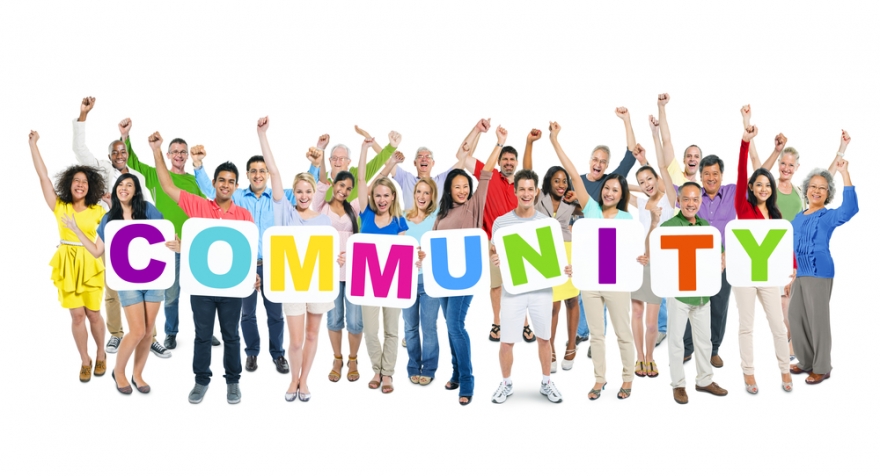|
5 Essential Elements of Well-being: Part 5 - Community
Rev. Kitty Boitnott, Ph.D., NBCT, RScP
Heart Centered Career Transition & Job Search Coach | Possibility Thinker

This is the last in a series that I have offered in recent weeks on the five essential elements of well-being. The series is based on the book, Well-being: The Five Elements.
In earlier posts, I offered other elements including career, social, financial, and physical.
Today's final element is Community Well-Being. You may think that this would be covered under "social." But Community Well-Being goes beyond personal friendships and individual relationships. Community Well-Being includes the broader community. It includes where you choose to live. It includes the quality of life in your geographic area. Tom Rath and Jim Harter, the authors of Well-Being, are very clear about this. They say that community well-being is the "differentiator between a good life and a great one."
We are, after all, social creatures. We grow up in families, but we also grow up in a larger social context.

We have extended family, and members of that family may be related, or they may not be. When I was growing up, I loved my neighbor, Hazel, as much as if she had been a relative. She loved me, and I loved her. Some of my earliest and fondest memories are of my being at her house. She made me feel at home. We weren't related by blood. But she was part of my larger community and contributed to my sense of well-being for sure.
Our schools make up our communities as well as our churches. Quality of life depends upon resources that we couldn't easily provide for ourselves. Resources like clean water are basic. But communities also need resources like libraries, parks, and museums. These resources add to the quality of life in any community. The absence of them impacts the community in negative ways.
Have you ever thought about what it would be like to live on a deserted island all alone? Remember the movie, Castaway? The main character suffered from many physical challenges during his "adventure." But he also experienced some profound emotional and spiritual challenges as well. Remember how he personified the volleyball, Wilson? He projected his need for friendship and companionship onto an inanimate object. In lots of ways, Wilson was a main character in the film. Wilson was representative of our need to be part of a larger community.
The bottom line is that we each need to be a part of a larger community for overall well-being.
Rath and Harter maintain that we need a sense of community well-being that starts with some of the basics. Water and security are among those basics. Many developing nations fail to provide these basic needs. Millions of people around the world live in places where clean, drinking water is hard to find. In war-torn countries (and there are too many of those) many of their citizens lack security of any kind. Even in the United States, there are some communities where you shouldn't be alone after dark. In those neighborhoods, people don't feel secure.
Rath and Harter assert that once you have your basic needs met, you need to be in an area that is a good fit for your personality. You should also consider family interests, and other pursuits important to you.
I was speaking with someone this morning who described his perfect community. He likes small towns with lots of open rural space, good neighbors, small shops, no malls, etc. You get the idea. He is longing for his home state of Vermont.
People often move around the country in search of like-minded individuals. They want a community that supports their individual needs. I talked with someone yesterday who shared that she plans to move to a western city. Her mid-western town no longer supports her philosophically or politically.
Single people tend to like the hustle and bustle of urban areas. They want to be "where the action is." Many of them enjoy having easy access to entertainment and their friends. Young couples with small children tend to gravitate to the suburbs with good schools. Others prefer the feeling of living in the open. They look for homes with lots of land around them. They like their neighbors but don't want them too close. They love the wide open space of the countryside around them and their homes.
And as we age, we move because of our jobs as well as for family reasons.
People belong to groups that have similar interests and goals. We join clubs and organizations that further us in a particular realm. Churches often provide a sense of community. Churches can begin to feel like "home" depending on your level of participation.
We receive many benefits from being part of the larger community.
But Rath and Harter contend that we also reap huge rewards when we contribute to the community in some way. We can give money, of course. But a greater contribution comes with contributing your time. Doing for others is rewarding.
We are members of our local neighborhoods and our larger communities. We are also members of the larger community of humanity, however. Indeed, we are "global citizens." If you don't feel connected on that level yet, that's okay. You will sooner or later. It is inevitable because the world is becoming a smaller and smaller place. Things that happen halfway around the globe will impact you in one way or another if not now, eventually.
Volunteering is one way to feel like a member of the community at any level. I know people who drive for Meal on Wheels and who donate part of their time at the local SPCA. During the holiday season, charitable organizations provide for families in need. Food banks provide food for those who need it. Opportunities to contribute your time are abundant. Rath and Harter recommend that even giving blood during a blood drive or throughout the year can increase your sense of community. Someone you don't even know may be saved by your donation of blood.
I am an organ donor and have been since I was 18 years old. I heard an elderly woman speak to the miracle of seeing after a cornea transplant. I was inspired to donate my eyes and other organs and did so.
Find ways to contribute that mean something to you.
You may have a high level of community well-being or a low level depending on your personality. But we all benefit from social interaction. Feeling like you are a part of the larger community at least some of the time is good for you.
People with high community well-being feel safe and secure wherever they live.
They take pride in their community. They want to give back and make a lasting contribution to society. They have identified areas where they can contribute to their community. They identify these areas based on their strengths and passions. They feel involved. They make their community a better place to live by their contribution to it.
Here are some recommendations for boosting the feeling of community well-being:
1. Identify how you can contribute to your community based on your personal mission.
2. Tell people about your passions and interests. They can connect you with relevant groups and causes.
3. Opt in to a community group or event. Even if you start small, start now. (p. 104)
Until next time.
You can watch anytime you want. It is running for the next few weeks, so feel free to watch whenever it suits you.
This Masterclass is for you if you don't love your job anymore and want to do how to find or create the job of your dreams.
It is possible...you just have to know how to do it, and this Masterclass offers some of the things you need to know in order to make it happen for you.
|